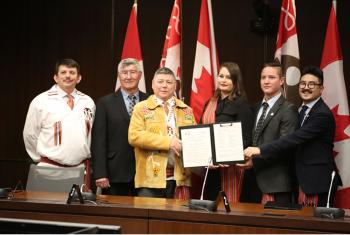Image Caption
Summary
Windspeaker.com Contributor
OTTAWA
A framework agreement with the federal government solidifies the Metis Settlement General Council as the only legislated land-based Metis government in Canada.
“We’re here right now in Ottawa to hold Justin Trudeau accountable for the promise of reconciliation. This is a big deal for the Metis settlements (in Alberta) following up from the Daniels decision that came down a couple of years ago,” said Metis Settlement General Council President Gerald Cunningham.
“This is the first time we’ve done anything with the federal government,” he said.
On Dec. 17, the Settlement Council signed the Framework Agreement for Advancing Reconciliation with the federal government. The framework recognizes and affirms their Sect. 35 rights and that the Settlement Council “is the appropriate government to engage with on collaborative policy development that affects the Metis Settlements.”
The framework was two years in the making, said Cunningham, noting that the first year involved convincing the Trudeau government that it couldn’t address its fiduciary relationship with the Metis, as outlined by the 2016 Daniels decision, through dealing only with the Metis National Council.
In a meeting with Crown-Indigenous Relations Minister Carolyn Bennett in January 2017, Cunningham says they finally got her to understand “the uniqueness of the Metis settlements of Alberta and that they would have to deal with us on a separate bilateral process.”
A memorandum of understanding was signed in December 2017 which one year later led to the signing of the framework agreement.
“(The framework agreement is) the key that opens the door for us to now be able to have a relationship with the federal government and also be able to get the federal government to recognize and affirm our Metis rights,” said Cunningham.
“Once that recognition is there, everything else will follow,” he added.
The framework agreement sets out a results-oriented negotiation process for the Settlement Council to work with the federal departments of Health, Indigenous Service, Crown-Indigenous Relations and Northern Affairs, Public Safety, and Employment and Social Development to close gaps in health, child and family services, community safety, employment, skills development, and housing on the settlements.
“Through this we will be negotiating much needed services we’ve been deprived of for so long,” said Cunningham.
There are eight Metis settlements in northern Alberta. In 1938, through the Metis Population Betterment Act, Alberta created 12 settlements. Since that time, four have been dissolved leaving the Metis settlements of Buffalo Lake, East Prairie, Elizabeth, Fishing Lake, Gift Lake, Kikino, Paddle Prairie and Peavine. The settlements comprise 1.25 million acres collectively with approximately 8,000 people.
The framework agreement also sets up means by which the federal government and the Settlement Council can work with the Alberta government “where Alberta expresses a willingness to become a participant in the Negotiation Process on a specific subject matter….”
Alberta will be involved in work undertaken to entrench Metis settlement lands in the Canadian Constitution. Presently, Metis lands are protected through the Constitution of Alberta Amendment Act.
“That one (land entrenchment) is going to take a little bit of time, but as long as we can get the discussions going, we’ll get it done. The main thing is getting it on the table,” said Cunningham.
The Metis Settlement General Council will receive funds from Canada to participate in the negotiation process.
Cunningham says that deeds are more important than words and sees the framework as a bilateral agreement that gets them to the negotiation table.
“They’re words on paper right now, but we’re working towards making them into deeds,” he said.
He adds it will take “a little while” for settlement residents to see the benefits that will flow from the agreement.
As other Metis across the country work towards the goal of acquiring land bases, Cunningham is hopeful this framework agreement can assist them.

